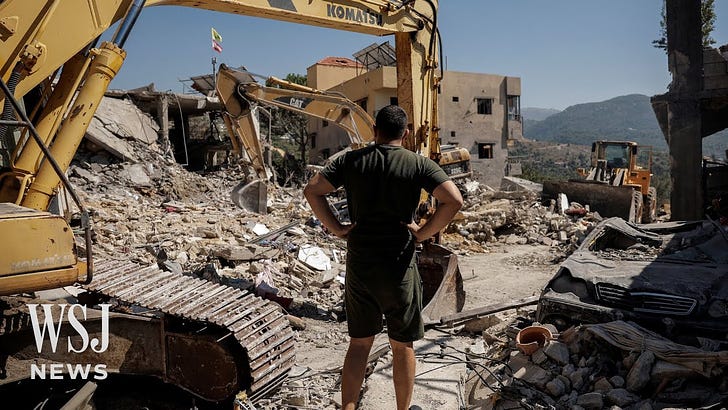Three Observations About the US, Iran, Israel, and “Escalation”
When much nonsense is being spoken, it’s worth it to mine for clarity.
1. Israel had barely begun to up the ante in fighting Hizballah before the world powers began making proclamations about it.
President Biden and President Macron said jointly: ““It is time for a settlement on the Israel–Lebanon border that ensures safety and security to enable civilians to return to their homes. The exchange of fire since October 7th, and in particular over the past two weeks, threatens a much broader conflict, and harm to civilians.”
A convocation of the European Union, the United States, Australia, Canada, France, Germany, Italy, the United Kingdom, Japan, Qatar, Saudi Arabia, and the United Arab Emirates called for a three-week ceasefire to “provide space for diplomacy” and said the current “intolerable” situation “presents an unacceptable risk of broader regional escalation.”
Here in Israel, we couldn’t help noticing that almost a year of daily Hizballah missile, rocket, drone, and mortar fire into Israel, predominantly at civilian targets, did not count as an “escalation,” was not “intolerable” or “unacceptable,” and did not “threaten a broader conflict.” At no time, of course, did President Biden or any other Western leader demand that Iranian Supreme Leader Ali Khamenei tell Hizballah to stop the bombardment. It could have gone on for another ten years; it was not, after all, an escalation, since only Israel is capable of escalating.
2. Republican Senators Tom Cotton and Mitch McConnell have sent a letter to President Biden that “strongly condemn[s] your administration’s continued delay in providing critical military equipment and weapons to our ally Israel in the midst of an existential war.” The letter says the US is denying Israel MK-84 bombs, which Israel needs “to hit Hamas’s deeply buried tunnels and other military infrastructure in Gaza,” while “Hezbollah also has significant military infrastructure that Israel must destroy”; Apache attack helicopters, which “Israel requested . . . last December, recognizing the increased need given the war in Gaza,” a need that “has only increased with Hezbollah’s escalation in the north”; and Caterpillar D9 tractors, which the administration is “holding up” even though Israel uses these “to clear improvised explosive devices (IEDs)” and “to save the lives of scores of Israel Defense force (IDF) soldiers and civilians.”
Iran, of course, is not known to deny its allies weapons but instead provides them abundantly and constantly—not because it wants these proxies to reach diplomatic “settlements,” but because it wants them to win their conflicts against Israel and destroy it. Although the US has never sought diplomatic “settlements” with al Qaeda or ISIS, the Biden administration has been pursuing such “solutions” with Hamas and Hizballah obsessively for months in utter futility. One side keeps displaying its desperation to avoid military action at all costs; the other side keeps pursuing its military objectives, and the region is a cauldron of fire.
3. Indeed, under simultaneous, multifront bombardment and terror attacks from Hizballah, Hamas, West Bank terror groups, the Houthis, militias in Syria and Iraq, and Iran itself (on April 14), it seemed to us here in Israel that a “regional escalation” had already been occurring for almost a year. What the US et al. mean by “regional escalation” seems to be, specifically—since all those other forces are already on the attack—that if the Israel–Hizballah fighting continues, Iran may enter the fray militarily on Hizballah’s side.
There could, of course, be ways to prevent that from happening, or to deal with it effectively if it does. The US—to its credit—now has formidable military assets in the region, and a warning to the ayatollahs not to get involved could well convince them not to. Or, if they were to jump in anyway, the US is much more militarily powerful than Iran and could presumably deflect it from that course with a few strikes on its oil—or, for that matter, its nuclear facilities.
Speaking of which, does the Biden–Harris administration have any plans for dealing with Iran’s looming nuclearization? Considering the way it projects a desperation to stay out of military conflict no matter what, it’s hard to believe that it does. Instead it worries about Israeli “escalation.”
Update, September 29: I posted this article not long before the dramatic news about Israel’s elimination of arch-terrorist Hassan Nasrallah in Beirut. Now, with Israel clearly taking the upper hand against Hizballah, and Tehran shocked and scared, the Biden administration is still prattling about a ceasefire. A visitor from another planet would think they want to throw Hizballah, and the axis of which it’s part, a lifeline.





Great post, btw. 😊
The words of Austin and the Lebanese minister at the UN, make me want to shake them violently until their teeth fall out. I'm angry; like EKB.
If the feckless UN enforced Resolution 1701, perhaps an IDF operation wouldn't be necessary. But no one mentions that. No one mentions that Iran supplies Hezbollah with the tools of war.
Bibi didn't flip flop. He did the usual Israeli thing by providing an option for peace. When he "read the room" the only option left was dismantling Hezbollah. May Hashem grant they fall apart like a house of cards!